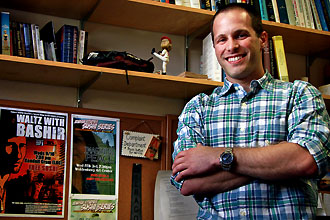Sushi and Jewish Films?
A Jewish studies movie and sushi? What could be a more natural combination? Michael Cohen, the acting director of Jewish Studies, says the popular Film Sushi Series is helping to keep the program on a roll.

Michael Cohen, the acting director of the Tulane Jewish Studies Program, wants to provide compelling and relevant programming for students and the New Orleans community. (Photo by Guillermo Cabrero-Rojo)
"Last year we had phenomenal success, with five films that drew between 125 and 275 people, and the students have run with it," says Cohen, an assistant professor of American Jewish history. "It's a recipe that works."
Cohen is pinch-hitting for the program's director of many years, Brian Horowitz, who is on sabbatical for the spring 2011 and spring 2012 semesters. Horowitz continues to teach in the program this semester.
Arab-Israeli issues is one hot topic that will be explored this year by the Jewish Studies Program. Today (Sept. 14), Kenneth Stein of Emory University will present "Arab-Israeli Negotiations With Begin and Sadat: Can It Be Repeated?" The lecture, free and open to the public, is at 4 p.m. in the Lavin-Bernick Center, room 203.
Stein, who is director of the Middle East Research Program and director of the Institute for the Study of Modern Israel at Emory, will explore what keeps Israel and its Arab neighbors from making headway that might result in a peace agreement.
The Film Sushi Series continues on Oct. 5 at 7 p.m. with a free showing of Ajami, an Academy Award nominee this year for best foreign language film, in the Freeman Auditorium of Woldenberg Art Center on the uptown campus. The film tells the stories of the intertwined lives of Arabs, Palestinians, Jews and Christians who live together in Ajami, an area of Jaffa, Israel.
Cohen hopes to bring filmmakers to campus to discuss the themes of their films as they apply to course content.
As for curricula, Cohen says he wants the Jewish Studies Program to continue providing courses that capture students' interest. Modern Jewish history courses continue to be the most popular, he says.
